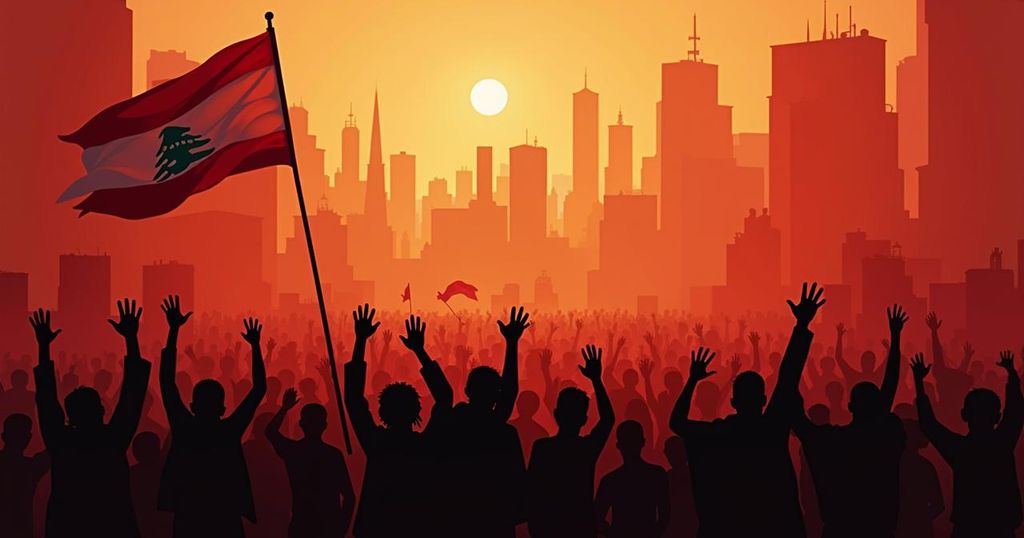Mass Protests Erupt in Iran and Yemen Against Israeli Actions in Lebanon and Gaza
On Friday, spontaneous protests erupted in Iran and Yemen against Israeli actions in Lebanon and Gaza, with demonstrators showing support for Hezbollah. This wave of unrest follows a missile attack by Yemen’s Huthi rebels, amidst ongoing violence that has claimed many lives. The protests have brought forth a display of solidarity and anger from the participants, reflecting deep regional tensions stemming from the current Israeli-Palestinian conflict.
On Friday, tens of thousands of protesters gathered in various cities across Iran, as well as in the rebel-held Yemeni capital, to express their outrage against Israeli assaults on Lebanon and Gaza. The demonstrations in Iran were organized following a call by officials to show solidarity with Hezbollah, the Iran-supporting militant movement in Lebanon, and to decry what they termed the “barbaric crimes of the Zionist regime” in Palestine, as reported by the official IRNA news agency. Hezbollah forms part of the “axis of resistance,” a coalition of Iran-aligned armed factions in the Middle East that have historically targeted both Israel and U.S. forces, particularly in support of Palestinian group Hamas. In Sanaa, Yemen’s Huthi rebels led a massive protest, gathering tens of thousands, a day after launching a missile towards Israel. Demonstrators in Tehran, notably after Friday prayers, convened at Enghelab Square, bearing images of Hezbollah leader Hassan Nasrallah, along with flags representing both Hezbollah and Palestine. Chants included declarations such as “Israel is destroyed. Lebanon is victorious,” and expressions of grief over a “bloodbath in Lebanon.” Protesters also displayed their anger by burning Israeli and U.S. flags. Furthermore, state television covered protests throughout various Iranian cities, including Semnan, Qom, and Shiraz. In Sanaa, Huthi supporter Mortada al-Mutawkil proclaimed, “We say to our brothers in Lebanon that you will be victorious, God willing,“ while another demonstrator, Mohammed Mushki, emphasized Yemeni solidarity with the Lebanese and Palestinian populace. In Bahrain, where the government actively suppresses demonstrations, smaller protests arose in solidarity with Gaza and Lebanon, where hundreds participated in calls to sever ties with Israel. The chants included assertions such as, “The people demand an end to normalization.” The catalyzing event for this wave of protests was the surprise attack by Hamas on Israel on October 7, which incited retaliatory actions from Israel and escalated cross-border hostilities from Hezbollah. These exchanges have surged perilously over the past week, with lethal consequences, including Israeli incursions into Lebanon that have claimed hundreds of lives, marking the most severe violence since the Lebanese Civil War (1975-1990). This escalating violence raises strategic concerns for Iran, as analysts note that Iran is attempting to support Hezbollah while cautiously avoiding a full-scale confrontation that could favor its adversaries.
The protests in Iran and Yemen were triggered by a dramatic uptick in violence between Israel and militant factions linked to Iran, particularly within Lebanon and Gaza. Hezbollah has emerged as a significant force aligned with Iran’s interests in the region, actively engaging against Israel and supporting Palestinian groups. The backdrop of longstanding conflicts involving Israel, Palestine, and Lebanese militancy has reinvigorated protests as populations rally against perceived injustices and external aggression. The situation is further complicated by regional politics, with Iran’s position being scrutinized as it navigates the balance of supporting its allies without escalating the conflict into a broader regional war.
The protests across Iran and Yemen illustrate a potent outpouring of solidarity with Hezbollah and the Palestinian cause in the wake of renewed Israeli military actions. This surge of public dissent reflects not only regional tensions but also the intricate web of alliances that characterize Middle Eastern geopolitics. As the situation deteriorates, the Iranian government faces the challenge of further commitment to its allies while managing the potential for wider conflict implications.
Original Source: www.france24.com




Post Comment